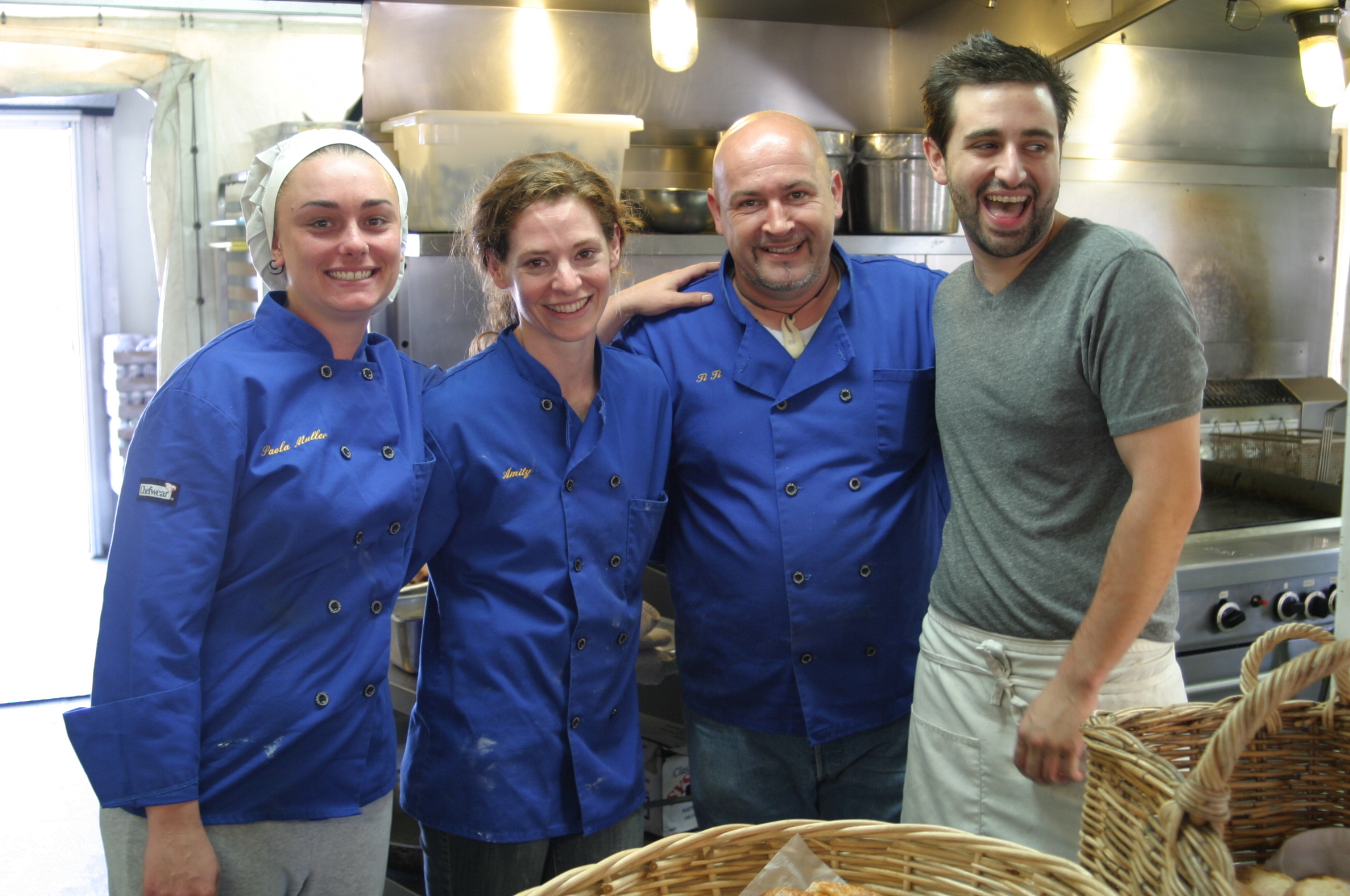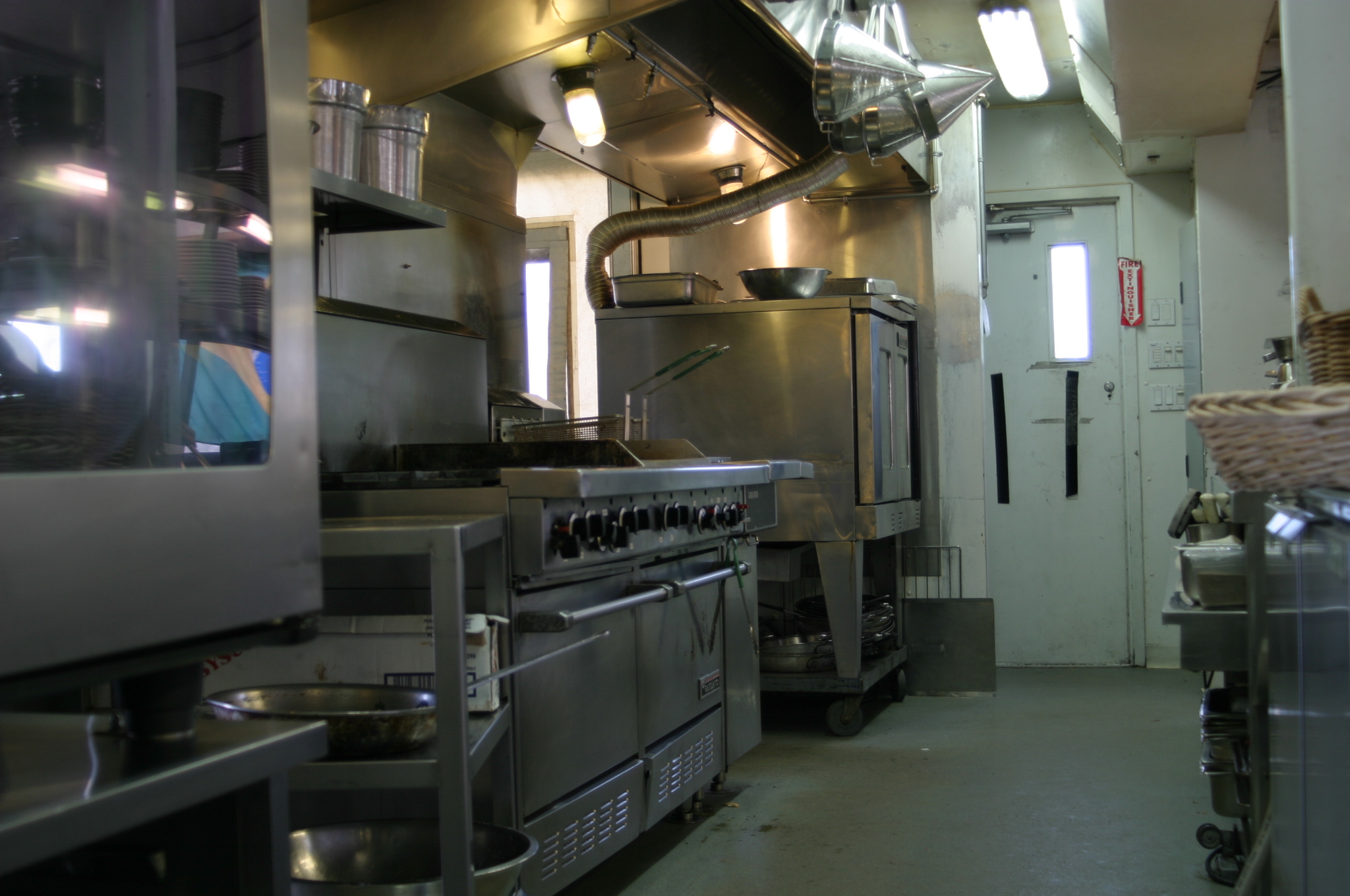Upon arrival at the Cirque du Soleil bigtop, you become a kid again. It doesn’t matter what kind of day you are having, the transformation is instant. Awe and wonder, curiosity and respect. Overall, it is surely a sense of largeness. That is exactly what was going on in my mind as I made my way through security and into the Cirque du Soleil grounds. As I waited for my escort, I noted the many large blue and yellow tents as well as the 24 flags that represent the nationalities of all of the performers. I had been invited to meet the chef in charge of feeding all of these bellies from around the world and I wondered which tent I would be led to. When I was led past all of the huge tents into an area that more resembled a construction zone, full of semi trailers, I began to get a small glimpse of the realities of a traveling show.
(Full disclosure: Thanks to the folks at Cirque du Soleil, my family has been invited back to the big top to see a performance and hence, the result of all of these hand made meals.)
The sparse and low tents that spread out from the two semi trailers that made up the kitchen and dining area were not exactly an image of glamour, but one of the ingenuity and necessity that is their nomadic lifestyle. I had no idea of what I would find inside. I expected very little, possibly something reminiscient of summer camp.
 Yes, this is a kitchen...
Yes, this is a kitchen...
This is what happens to a mind as you enter the unknown. Had I considered more deeply the importance of this area for the whole show, had I known that this humble area was indeed the heartbeat and lifeblood of Cirque du Soleil, I might have been more prepared. Upon entering, the first thing I noticed was not only the deceptive size of the kitchen, but the fact that this place was cozy. I wanted to step back outside and see if I had mistakenly entered a different tent. The lights were pleasant, fabric hung from the metal rafters and half of the dining area was set up like a lounge with a tv, computers, books and cozy chairs. The kitchen itself though might make some restauranteurs in the twin cities jealous. A walk-in cooler and freezer, six burner stove and flattop, two convection ovens, a couple of hobart mixers and a full dish washing station. Wow, did I have questions. Luckily, I was just about to meet the man who could answer them. Going simply by “Ti Ti” (exactly what was on his chef coat, by the way) the head chef of Cirque du Soleil was immediately friendly, warm and full of enthusiasm.

I suppose I thought that perhaps the person in charge of feeding 150 calorie burning athletes in a converted trailer would show the signs of stress. If I had already known that he had been doing this for seven years straight, from Japan to Brasilia to Minnesota, I would have forgiven him if he would have been a bit tired, broken down and gruff. Ti Ti was none of these. He carried the air of a man who relished the challenges of the job and who understood that if the show is to go on, the food has to come first.
In fact, Cirque du Soleil was a sort of rebirth for Ti Ti. Trained in France and living in Montreal, he was considering leaving the restaurant business, when he heard about an opportunity to cook for Cirque du Soleil. It wasn't long before he became the head chef and in a business where there is high turnover, Ti Ti found stability and new life.
It can be hard to imagine the attraction when you consider his schedule. The troupe spends, on average, four to ten weeks in any one location before moving on. When they do move, the food is the last thing to go and first thing up. This means that Ti Ti has to fly out on a Sunday night to the new location, spend Monday meeting food vendors and setting up contracts and is hopefully ready to start feeding people again on Tuesday morning. If the truck is too far behind he may have to rely on catering. Sometimes they set up barbecues and cook outside until the equipment shows up.
Now consider the menu. People from 24 nations come together and need to eat, 3 meals a day or more. There is actually food available from 8 a.m. until 11 at night. Did I mention that he and his three staff have to hire and train 12 local cooks each time they move, imagine Chicago or Lima, Peru. You can bet that everyone speaks more than one language and despite the fact that English is the "official" language in the kitchen, I heard very little the whole time I was there.
 Ti Ti and his staff (from Brazil, Maine, France, Quebec)
Ti Ti and his staff (from Brazil, Maine, France, Quebec)
So, of course, I asked him, "Why do you do it?"
Nothing this complicated could have a simple answer. First, he said that he absolutely loved the challenge and opportunity to learn new recipes, styles and cuisines. Without the distraction you may have in your hometown, you get very little of that on the road. You focus on your work and your community. This allows ample opportunity to learn and experiment. Whether it be a Chinese performer taking time to teach the kitchen a special dish or a special request for comfort food, Ti Ti and his staff seem to relish the opportunity to keep learning. As a matter of fact, Ti Ti has a book for the Cirque du Soleil staff and performers to request their favorite foods from their homelands. If he doesn't know how to make something, he learns. They also have theme days where everything will be Mexican, for example.

Then there was the sourcing. What seemed to me an impossible challenge, was one taken on with curiosity and excitement. Ti Ti knows first hand what local food is no matter where he goes. His favorite part of traveling with the show is the ability to satisfy his personal curiosity with new and unique foods and cuisines. Both on his days off as well as the first day he arrives at a new locale, Ti Ti takes time to learn and discover what local food means. On this topic, he is quick to point out that his favorite places to cook and eat are without a doubt Peru and Japan. I immediately noticed that both were quite far from his French beginnings, but he assured me that these two places were quite similar in the respect and reverance that they have for food. In Peru, the quality was not only extremely high, but the cost was comparitively low, especially for seafood. How does this translate to the Cirque du Soleil? Well, when working on a budget, if seafood is cheap, it shows up daily on the menu. Japan was similar in quality, but opposite in price. And what about the U.S.? Ti Ti noted that the great thing was the availability of almost anything he could want, any time of the year. The cost and quality, however, was sometimes suspect. This is America, the melting pot. We tend to carry our food habits and histories with us, instead of trying to connect with what the land around us can supply. Our habits become so ingrained, that in-season is not in most people's food vernacular. Perhaps these nomads had quite a lot to teach me.
My head was beginning to spin a bit with all of the new information and my imagination was starting to want to stay in Peru or Brazil. However, my learning was not over yet. I had one final revelation. It came after I had spent about an hour in the dining/lounge area talking with Ti Ti and his staff. I noticed that I was the only person there who had performed a handshake. Every time someone came in the door, it seemed like it was hugs, a kiss on the cheek, genuine warmth. This blew me away. Even his kitchen staff refused his hand to grab a hug instead and I realized once again the strength of the bond of community. And once again, the community gathered around food. It didn't matter that these people had to be with each other day in and day out. They stuck together, cooked together and ate together. It made me want to go and invite all of my friends and family over for another epic cooking party. I wanted to travel. I wanted to cook for the whole world. In the end, what I really needed was a hug, because I suddenly realized something. As long as we continue to love food and eat it together, we can accomplish anything. Even acts of great risk and daring.
For more information: Cirque du Soleil.

Lawrence Black is a writer and editor at Simple, Good and Tasty. He can be reached at lawrence@simplegoodandtasty.com.




